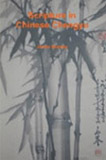
Scripture in Chinese Chengyu
finding Christ in Chinese stories

finding Christ in Chinese stories
The Background for Chinese Idioms
The usual translation of chengyu is ‘idiom.’ The American Heritage Dictionary defines `idiom' as "an expression having a special meaning not obtainable or not clear from the usual meaning of the words in the expression." In other words, an idiom, at least in English, is a phrase with the sum of its constituent words having a very different meaning from that of the individual words. Chengyu, of course, has this meaning, but it also carries much more, providing insight into Chinese culture and language.
In Chinese, there are many synonyms for chengyu including yanyu (a proverb), shuyu and xiyu (idiom), suyu (common folk expression), diangu (an allusion or literary quotation), mingyan (famous quotation or familiar saying), and finally yuyan, an allegory or parable. According to Yang (1987) Chinese sayings have even been likened to biaoayu and kouhao, which means ‘slogan, poster, or watchword.’
Chengyu usually have folk tales or fables that provide their context and from which they are derived. Stories from Confucius, Mencius, Hanfeizi and others, composed and used for the purpose of teaching ethics, have become ingrained in the Chinese consciousness. The mention of a short, four-character phrase from a story (the chengyu) is enough to cause any Chinese to recall the story and the ethic it teaches.
Why does a society develop folklore? Anthropologists have suggested that cultures develop folk tales to teach ethics and values to a younger generation as kind of a self-preservation mechanism. This may be true, but this doesn’t adequately explain the manner of instruction. Though Western culture has its share of folktales (Aesop’s fables, Grimm’s fairy tales, American ‘Paul Bunyan’ stories) it must be said that these tales developed in a more rural, agrarian and concrete-thinking period of history. Families had traditions and stories that served to unite family members and encourage accountability to the clan. As western society became more urbanized, the preferred method of instruction was more abstract and Aristotelian. Although Aristotle was keen on observation of phenomena and insisted that any investigation must begin with concrete particulars, attempts to categorize and systematize phenomena began to shift attention to the categories as opposed to the phenomena categorized. The situation appears to have degenerated to the point where a greater fascination with words than with the objects they represent has developed.
Historically, the Chinese as a people have a preference for the concrete over the abstract, the pragmatic over the metaphysical, compromise and balance over dogmatism. Their culture developed in an authoritative/agrarian milieu which puts a high premium on relationships, conformity, and social interactive responsibility. The Chinese emphasis on relationships is reflected in their concern for the concrete responsibilities of everyday life, and their habit of syncretism and pragmatism provided them the ability to reconcile the widely divergent philosophies of Confucianism, Taoism, and Buddhism and remain comfortable about it.
The Chinese language tends to encourage a focus on the concrete over against the abstract. “Chinese lacks a general lexical item which may embody both the concreteness and abstractness of a noun like thing in English.” Abstract nouns of verbal or adjectival origin are often treated as names of entities in Chinese (e.g. dao, tian). However, verbal concepts are seldom treated as though they were nominal concepts. The Chinese can form abstract concepts of course, but have difficulty with western Platonic concepts—speaking about representative, symbolic objects as real objects. Chinese verbs and adjectives cannot be grammatically nominalized.
In the past, Chinese translators have often found difficulty expressing what they want to say, and simply borrowed the Japanese term composed of Chinese characters, e.g. zhexue (philosophy), benneng (instinct), jingqi (boom), pochan (bankrupt), ganbu (cadre),zhuguan (subjective), and keguan (objective). It is interesting that these terms were created by the Japanese following contact with the English. Perhaps this demonstrates that western concepts of “philosophy,” “subjective” and “objective” reality were unknown in Japan and China. We do know that ancient Chinese philosophy avoided the metaphysics of the West and remained concrete and practical in its presentation.
The Chinese use of chengyu and their familiarity with the ancient stories behind them is a testimony to the Chinese consciousness of their history. In China, people do not speak of their past in terms of dates, but will say something like, “Such and such took place during the Tang dynasty.” By their use of chengyu, the Chinese are linking themselves with their ancestors in the past and the mass of the Chinese people in the present.
You can purchase a copy of this book from either Amazon.com or barnesandnoble.com